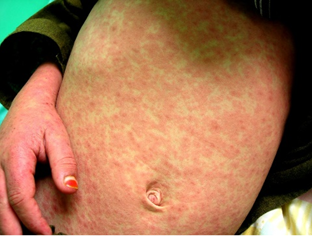By Jenna Beam
If you’ve been alive at any point since 1998, chances are you’ve heard about the anti-vax movement. As a part of this movement, parents refuse to vaccinate their children. This movement was started on the back of a “study” (it was a scam) that falsely claimed a link between vaccines and autism (which doesn’t exist). Despite the fact that this study has been disproven countless times, the anti-vax movement forges on. While these false claims have definitely harmed the public opinion of science, what’s the biggest fall out of the anti-vax movement? The rise in cases of previously eliminated, and completely preventable, diseases – like the measles.
Before the measles vaccine was introduced in 1963, measles caused close to 3 million deaths around the world every year. In the decades since the introduction of the vaccine, we’ve seen a steady drop in the number of people infected with measles virus. But since 2018, the number of measles cases around the world has increased by 300%, largely due to the spread of the anti-vax movement. In the United States alone there were 17 outbreaks of measles in 2018.

The measles is caused by the measles virus. The measles is incredibly contagious and most often spread by infected people coughing and sneezing near uninfected people (cover your coughs, friends). Like most infectious diseases, the measles is most serious in children under 5 and in older adults. When someone has the measles, they will develop a cough, a high fever, a runny nose, and often a bright red rash (see photo to the left). However, there can be more severe complications, like pneumonia and brain swelling. And, although very rare, there are cases of long-term complications (called SSPE; you can read about it here), which can be fatal. Before the introduction of the vaccine, measles virus was associated with 50% of all childhood deaths. But here’s the kicker – these deaths were often caused by infections other than the measles. Wait, what?
What’s that all about!? Studies in the past have hinted at the idea of immune amnesia and a new study has offered the first evidence of immune amnesia in kids from the Netherlands. To talk about immune amnesia, let’s take a few steps back. Your immune system is your body’s defense system. It’s made up of a bunch of different specialized cells that try their very best to keep you protected and healthy. A lot of vaccines, including the measles vaccine, cause a special type of immune cell, called B-cells, to produce molecules called antibodies. These antibodies are important because they can stop toxic molecules, called toxins, from killing your healthy cells. When antibodies block toxins from killing your healthy cells, it’s called neutralization. Most vaccines cause your B-cells to make antibodies against whatever infection the vaccine is against. For example, when you get the measles vaccine, your B-cells make antibodies against the measles. So if the measles virus ever tries to infect you, your body is primed and ready to fight it. Pretty cool, right?
Now back to immune amnesia. As the term suggests, immune amnesia is basically when your immune system forgets how to fight an infection. What scientists have found is when someone who is NOT vaccinated gets the measles, the measles virus infects their B-cells and causes them to “forget” how to make up to 73% of the antibodies it used to make against other infections.

You can think about it like this: if your body knows how to make 100 antibodies against the virus that causes the cold, after you get the measles, your body might only remember how to make 30 antibodies against the cold. This could mean that if the cold virus tries to infect you again, your body might not remember how to fight it and you could get a nasty cold. Measles AND a cold?! Talk about a bad day!
The good news is that getting the measles vaccine won’t make your B-cells forget how to make antibodies. The extra good news is that the measles vaccine is really good at protecting you from the measles. And the extra extra good news is that getting vaccinated not only protects you, but also your family, your friends, and everyone else you come in contact with! In fact, according to the Centers for Disease Control and Prevention (CDC), the vaccines currently available in the United States are the safest in history.
Despite the negative press vaccines get from “anti-vaxxers,” vaccines are an incredible scientific development and help keep us all happy and healthy! So if you don’t want to feel measle-able, make sure you’re up-to-date on your vaccines. To learn more about the measles virus and immune amnesia, check out these other articles!
CDC data source: https://www.cdc.gov/measles/cases-outbreaks.html
Edited by Rachel Cherney and Sarah Brotman
